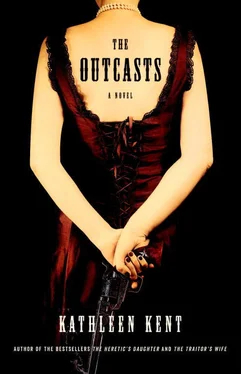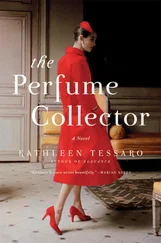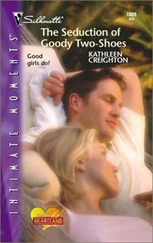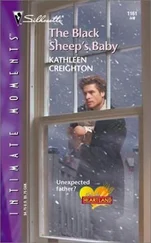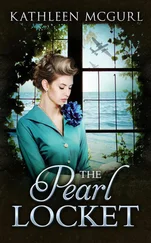Turning her face slightly to him, she curled her lips upwards and asked, “Is that what you did before coming to Middle Bayou?”
“Yes. I had twelve hundred acres of cotton and tobacco in Mississippi. Before the war.”
He stared off down the road, his eyes fixed and tormented-looking, his momentary silence testament to all he had lost. He released his grip on her elbow and pointed out the Grant farm in the distance. The main house was a small, misshapen affair but situated in a field of flat-leaved grasses that reflected sunlight off their wavering tips like an ocean of copper mirrors.
Approaching Red Bluff Road, Lucinda saw the schoolhouse and was surprised. She had been prepared for a refitted barn or disused carpentry shed, but at the juncture of the Middle Bayou Road and Red Bluff was a new pine building, the boards still oozing sap. The women positioned Elam in the shade of a tree and followed Lucinda inside.
There were only a few windows, and they all stood quiet for a moment, letting their eyes adjust to the darkened room.
“The desk was brought from my own office,” Euphrastus said. Lucinda ran the pads of her fingers appreciatively over the carved surfaces, allowing one forefinger to slip lingeringly into a bit of scrollwork.
Euphrastus, watching the movements of her hands, became short-winded and made a show of studying the view from one of the windows before sweeping his wife and daughter to the door. “We will accompany you tomorrow morning, Miss Carter, to introduce you to your pupils.”
She watched them walking homeward for a while, standing at the same window Euphrastus had been looking through. This time, Euphrastus pushed the wheeled chair. Lucinda stretched her arms and pulled off her bonnet. She examined the readers and workbooks stacked precisely on the desk and counted thirteen sets of each.
There were three rows of sturdy benches with long, unbroken planks in front of them, raised and tilted, for writing. She sat in the wooden chair behind Euphrastus’s desk and let her mind wander. Only a few weeks of this, she reminded herself, so it hardly matters what I stuff their heads with; she would teach the farmers’ offspring what she liked, and put laudanum in the water bucket for the troublemakers.
She shifted her gaze and saw May in the open doorway. The girl wandered in and came to stand in front of the desk. She was wearing a dress of cornflower blue, the same startling color as her eyes. The dress was ten years out of fashion but capably reworked to fit her small frame.
May picked up a reader and pretended to study it. “Do you want to know a secret?”
Lucinda smiled. “Only one?”
May slipped onto one of the benches and rested her elbows on the writing board. “My name is not really May.”
“Oh?”
“It’s Jane.”
Lucinda cocked her head. “Isn’t that your sister’s name?”
“It is Jane. We’re both Janes.” May stage-whispered the last and, laughing, sprang from the bench, coming to alight on the desk in front of Lucinda. “My mother, who was the second Mrs. Grant, had her way and named me Jane also. It was the only name she said she’d ever wanted for her girl. Father couldn’t abide having two Janes under the same roof, though, and took to calling me May, the month I was born.”
“And what does your mother call you?”
“My mother calls me nothing. She is not with the living.” May slipped off the desk and Lucinda watched her progress about the room, examining and overturning every item, looking into each corner. Lucinda reminded herself to be cautious with this one.
“The last time I saw my mother,” May went on, “I was four years old. She sat next to Father in a buggy headed to Little Rock. Father had told us that she was very ill and he was taking her for the doctor. She was wearing a bonnet, one with colored ribbons. He returned later that night, alone, my mother’s bonnet hanging by its ribbons from the struts. There’s a big river on the way to Little Rock, you see.”
Lucinda did not see, but May suddenly said, “I hear Jane calling.” She darted for the door, but before leaving, she stopped and turned, smiling through bowed lips.
Lucinda watched her hurtling down the road and off into the fields, her dress showing in blue, vibrating swaths through the tall grass.
She stayed at the school until the supper hour and then left, latching the door, thinking she had forgotten to ask Euphrastus for the key. But there was no lock on the door—nothing but knowledge to steal—and, arranging her bonnet on her head, she walked down the road back to her room at the Wallers’. There had been biscuits and cornmeal for breakfast. She hoped there would be meat for dinner.
The weather had turned: the men rode the last ten miles to Austin in rains that were near horizontal. The storm had come in from the northwest, and the frigid rain ran in sluices down the collars of their oiled coats.
When they got to the banks of the Colorado River, they saw that the bridge had been washed away and the ferry was gone, probably swept downriver. They watched the surging waters and the things chased along with the current—bits of wood and sacking, the upright hooves of some cloven animal—and then they turned around and made for an abandoned house they had seen a quarter of a mile back.
They found it after a few pass-bys and saw that it had a lean-to shed on one side. But the shed was too small for the three horses and the mule, so they stripped the horses of tack, stored the supplies in the shed, and left the animals standing together, huddled and spring-footed, beneath the overhang of the porch.
The house had not long been abandoned, and the roof was mostly intact, the floor with dry areas large enough to sleep on. The stove was old, but the wood from the bin was sufficiently dry to catch a small flame, and the men stripped down and shivered close to the frail warmth as they searched for dry shirts and long underwear. The steam rolled off their bare backs in wisps. “Like smoke off bacon,” Dr. Tom observed.
Nate lit a lantern, and his boot caught the edge of a bottle, sending it rolling against one wall. He picked it up and saw it was a nearly empty bottle of Argyle Bitters. The label claimed the contents would carry away the bile, rendering the patient less distempered, and he wondered if it, or anything, could lessen the punishing silence from Deerling the past two weeks. The only human voice he had heard speaking directly to him was Dr. Tom’s.
A few times, he had tried to write his wife about what had come to pass, but he couldn’t find the words to tell her. He had revealed to her long ago the sum total of his service during the war: the one summer spent in Arkansas, where he had arrived at sixteen as part of a mounted cavalry force from Texas. Where, within the space of a month, he had been officially dismounted, forced into infantry status along with thousands of other Texans, brought low with dysentery, and finally sent home with all the other men under sixteen or over forty.
But there appeared to be no foothold by which to regain Deerling’s confidence. The man seemed to discount and undermine him at every turn. It was more than just the silence, Deerling refusing to speak to him, as though Nate were a ghost haunting the campsite. There were the deliberate actions designed to unseat Nate’s nerve.
Two days after the shooting at the creek, the men had been hunting for rabbit and quail, anything to supplement the constant rations of jerky. Each man had picked his own path away from the road, and Nate followed a trail into a rocky gully, where he spied a mottled gray rabbit settled on a large boulder. He took aim, but a rifle blast behind him made him flinch wildly and misfire. He jerked his head around in time to see Deerling at a distance behind him lowering his Winchester. The ranger moved past him, grabbed the dead rabbit by the hind legs, and returned to camp, all without a word.
Читать дальше
